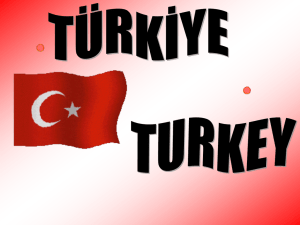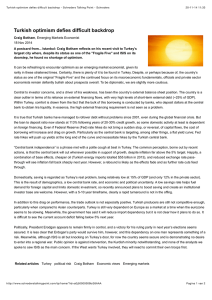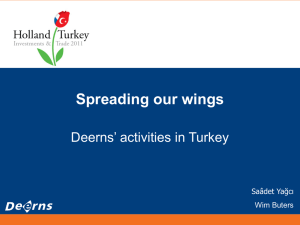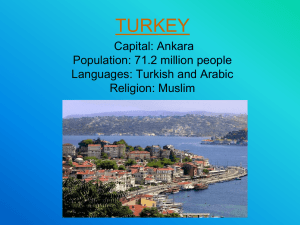Turkey - WordPress.com
advertisement
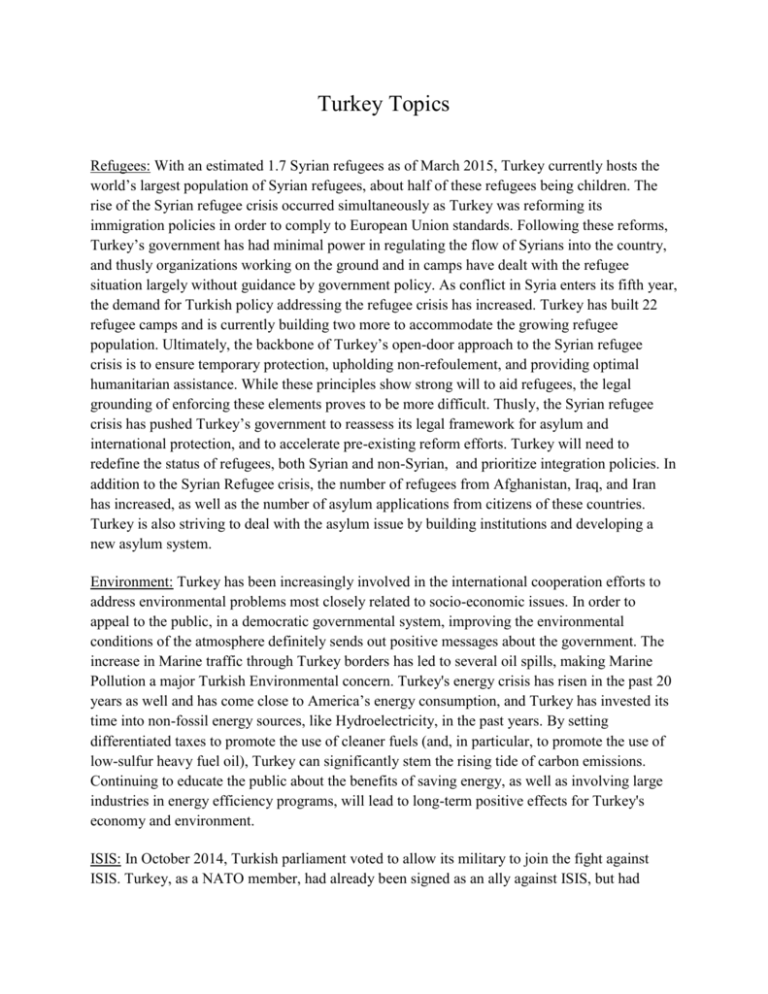
Turkey Topics Refugees: With an estimated 1.7 Syrian refugees as of March 2015, Turkey currently hosts the world’s largest population of Syrian refugees, about half of these refugees being children. The rise of the Syrian refugee crisis occurred simultaneously as Turkey was reforming its immigration policies in order to comply to European Union standards. Following these reforms, Turkey’s government has had minimal power in regulating the flow of Syrians into the country, and thusly organizations working on the ground and in camps have dealt with the refugee situation largely without guidance by government policy. As conflict in Syria enters its fifth year, the demand for Turkish policy addressing the refugee crisis has increased. Turkey has built 22 refugee camps and is currently building two more to accommodate the growing refugee population. Ultimately, the backbone of Turkey’s open-door approach to the Syrian refugee crisis is to ensure temporary protection, upholding non-refoulement, and providing optimal humanitarian assistance. While these principles show strong will to aid refugees, the legal grounding of enforcing these elements proves to be more difficult. Thusly, the Syrian refugee crisis has pushed Turkey’s government to reassess its legal framework for asylum and international protection, and to accelerate pre-existing reform efforts. Turkey will need to redefine the status of refugees, both Syrian and non-Syrian, and prioritize integration policies. In addition to the Syrian Refugee crisis, the number of refugees from Afghanistan, Iraq, and Iran has increased, as well as the number of asylum applications from citizens of these countries. Turkey is also striving to deal with the asylum issue by building institutions and developing a new asylum system. Environment: Turkey has been increasingly involved in the international cooperation efforts to address environmental problems most closely related to socio-economic issues. In order to appeal to the public, in a democratic governmental system, improving the environmental conditions of the atmosphere definitely sends out positive messages about the government. The increase in Marine traffic through Turkey borders has led to several oil spills, making Marine Pollution a major Turkish Environmental concern. Turkey's energy crisis has risen in the past 20 years as well and has come close to America’s energy consumption, and Turkey has invested its time into non-fossil energy sources, like Hydroelectricity, in the past years. By setting differentiated taxes to promote the use of cleaner fuels (and, in particular, to promote the use of low-sulfur heavy fuel oil), Turkey can significantly stem the rising tide of carbon emissions. Continuing to educate the public about the benefits of saving energy, as well as involving large industries in energy efficiency programs, will lead to long-term positive effects for Turkey's economy and environment. ISIS: In October 2014, Turkish parliament voted to allow its military to join the fight against ISIS. Turkey, as a NATO member, had already been signed as an ally against ISIS, but had shown little initiative in actively stopping the terrorist group or even restricting ISIS’s access to Syria through Turkish land. However, following the bombing of the Turkish town of Suruc by ISIS, which left 32 dead, in July 2015, ISIS is now considered an immediate threat to the Turkish government. In retaliation, Turkish F-16s attacked ISIS forces positioned in Syria to show an active change in position as far as the county’s affiliation with ISIS. Prior, Turkey had remained out of conflict for two years, and had even engaged in conflict with the Kurds who have been working with the US in their fight against ISIS. Turkey views the rise of ISIS as a result of Sunni discontent with the Syrian regime. Ultimately, Turkey’s involvement against ISIS is a culmination of direct attacks on Turkish land, ISIS’s strengthened position along their border, and increased pressure from the US to become more actively involved. Turkey has given permission for the US to use American warplanes on Turkish bases in order to advance combat with ISIS. Turkey’s active involvement against ISIS is a ultimate success for US military, and will aid the fight greatly. However, Turkey will have to continue cautiously navigating the murky waters with the Kurdish forces, given their conflicting history with Turkey and the high feelings of mutual distrust between the two groups. Women: Since the establishment of the Turkish Republic in the 1920s, women have had equal status with men in Turkish society, at least in law. But during the Ottoman Empire, Turkish society was ruled by shari'a (Islamic religious law) and a body of medieval social custom for 500 years, and significant cultural change does not come overnight. The status of women in Turkey is different from what it is in your home country. Not "better," not "worse," but different. In some ways, women may seem subservient to men; but Turkey had a female supreme court justice long before the USA did, and Turkey has had a female head of government, something the USA, for all its success in women's liberation, has not yet had. Men's and women's roles were clearly defined in traditional Turkish society and each gender was more or less sovereign within its appropriate realm. The husband-father was head of the household, but the wife-mother was in charge of the house and family. Men went out of the house to deal with the world of business, government and military; women stayed close to home and tended the crops, the animals and the household. Border Issues: Border issues many include being close or collected to the following countries, Iran, Syria, and Iraq. Turkey has some border issues with the ISIS also, so Turkey and the US have agreed on the outlines of a plan to drive Islamic State out of a strip of land along the Turkish-Syrian border, according to reports, in a landmark deal that will draw Turkey further into Syria’s civil war and looks likely to increase the intensity of the US air war against Isis. The agreement to create an “Islamic State-free zone”, as officials are calling it, comes days after a wave of violence linked to the Syrian conflict prompted Turkey, a Nato member, to launch air strikes for the first time against Isis and allow a coalition led by the US to use its airbases to bomb militant targets in Syria. Health: Turkey embarked on an ambitious health system reform to overcome major inequities in health outcomes and to protect all citizens against financial risk. Within 10 years, it had achieved universal health coverage and notable improvements in outcomes and equity. Health insurance was introduced in Turkey in 1945, at first covering blue-collar workers and later other groups. From 1960 onward, Turkey's 5-year development plans included universal health coverage as an objective; a new constitution in 1982 guaranteed rights to health insurance and health services; and a 1987 Basic Law on Health aimed to operationalize these rights. But the law wasn't implemented, universal coverage failed to materialize, and the poor and unemployed remained without effective coverage. Although the “Green Card” scheme was introduced in 1992 to cover low-income households, it wasn't integrated with existing insurance schemes and lacked a system for identifying potential beneficiaries and it provided limited financial assistance. Battling economic instability, rampant inflation, rising unemployment, and a dissatisfied public, successive coalition governments between 1990 and 2002 did not prioritize health coverage and services. The Turkish health system faced insufficient and inequitable financing, a shortage and inequitable distribution of physical infrastructure and human resources, disparate health outcomes, and public dissatisfaction. Turkey's experience shows that with committed leadership, middle-income countries can achieve universal health coverage and simultaneously improve population health, financial risk protection, and user satisfaction — health system goals to which all countries should aspire.



